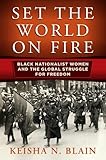Set the World on Fire : Black Nationalist Women and the Global Struggle for Freedom / Keisha N. Blain.
Material type: TextSeries: Politics and Culture in Modern AmericaPublisher: Philadelphia : University of Pennsylvania Press, [2018]Copyright date: ©2018Description: 1 online resource (264 p.) : 15 illusContent type:
TextSeries: Politics and Culture in Modern AmericaPublisher: Philadelphia : University of Pennsylvania Press, [2018]Copyright date: ©2018Description: 1 online resource (264 p.) : 15 illusContent type: - 9780812294774
- African American women political activists -- History -- 20th century
- African American women -- Political activity -- History -- 20th century
- African diaspora -- History -- 20th century
- Black nationalism -- History -- 20th century
- Pan-Africanism -- History -- 20th century
- Women -- Political activity -- United States -- History
- HISTORY / United States / 20th Century
- African Studies
- African-American Studies
- American History
- American Studies
- Political Science
- Public Policy
- 320.54/60904 23
- E185.6 .B65 2018eb
- online - DeGruyter
| Item type | Current library | Call number | URL | Status | Notes | Barcode | |
|---|---|---|---|---|---|---|---|
 eBook
eBook
|
Biblioteca "Angelicum" Pont. Univ. S.Tommaso d'Aquino Nuvola online | online - DeGruyter (Browse shelf(Opens below)) | Online access | Not for loan (Accesso limitato) | Accesso per gli utenti autorizzati / Access for authorized users | (dgr)9780812294774 |
Frontmatter -- CONTENTS -- Introduction -- 1. Women Pioneers in the Garvey Movement -- 2. The Struggle for Black Emigration -- 3. Organizing in the Jim Crow South -- 4. Dreaming of Liberia -- 5. Pan-Africanism and Anticolonial Politics -- 6. Breaks, Transitions, and Continuities -- Epilogue -- Notes -- Index -- Acknowledgments
restricted access online access with authorization star
http://purl.org/coar/access_right/c_16ec
In 1932, Mittie Maude Lena Gordon spoke to a crowd of black Chicagoans at the old Jack Johnson boxing ring, rallying their support for emigration to West Africa. In 1937, Celia Jane Allen traveled to Jim Crow Mississippi to organize rural black workers around black nationalist causes. In the late 1940s, from her home in Kingston, Jamaica, Amy Jacques Garvey launched an extensive letter-writing campaign to defend the Greater Liberia Bill, which would relocate 13 million black Americans to West Africa.Gordon, Allen, and Jacques Garvey—as well as Maymie De Mena, Ethel Collins, Amy Ashwood, and Ethel Waddell—are part of an overlooked and understudied group of black women who take center stage in Set the World on Fire, the first book to examine how black nationalist women engaged in national and global politics from the early twentieth century to the 1960s. Historians of the era generally portray the period between the Garvey movement of the 1920s and the Black Power movement of the 1960s as one of declining black nationalist activism, but Keisha N. Blain reframes the Great Depression, World War II, and the early Cold War as significant eras of black nationalist—and particularly, black nationalist women's—ferment.In Chicago, Harlem, and the Mississippi Delta, from Britain to Jamaica, these women built alliances with people of color around the globe, agitating for the rights and liberation of black people in the United States and across the African diaspora. As pragmatic activists, they employed multiple protest strategies and tactics, combined numerous religious and political ideologies, and forged unlikely alliances in their struggles for freedom. Drawing on a variety of previously untapped sources, including newspapers, government records, songs, and poetry, Set the World on Fire highlights the flexibility, adaptability, and experimentation of black women leaders who demanded equal recognition and participation in global civil society.
Mode of access: Internet via World Wide Web.
In English.
Description based on online resource; title from PDF title page (publisher's Web site, viewed 24. Aug 2021)


